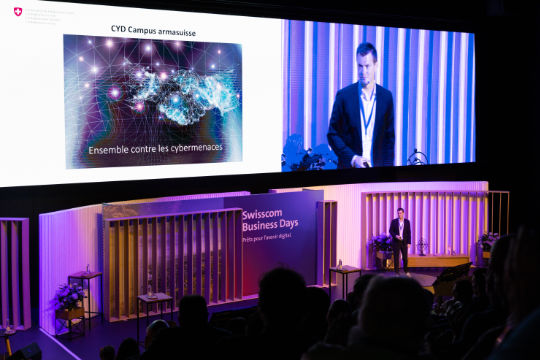The latest sustainability, cybersecurity and innovation insights
Solutions for the millennium at the «Millennium’» building
Sustainability, IT security and innovation: Swiss companies are currently addressing these three issues, among others. A Swisscom event focused on new approaches and solutions. A brief overview of the most important insights.
Text: Andreas Heer, Image: Millennium, Swisscom, a
Which topics with a technical aspect are companies currently focusing on? These certainly include sustainability, IT security and innovation. The Swisscom Business Days in Crissier focused on these three topics and possible solutions to these challenges, as well as a forecast of what the future of the internet could look like.
The physical framework itself provided an insight into sustainable technologies. The Millennium building in Crissier, a modern office complex with mixed use (restaurant, crèche, gym, etc.), not only has district heating and a photovoltaic system. The window panes are designed to darken automatically when exposed to strong sunlight, which stops the interior from overheating and saves energy that would otherwise be used on cooling.
Farmers can also save resources, namely pesticides. Ecorobotix from Yverdon was an example of sustainable innovation. The tractor trailer, which has been developed from scratch, uses cameras and artificial intelligence to detect weeds in the field, target these plants and then spray them. As a result, pesticide use can be reduced by up to 95 percent. Will Ecorobotix conquer the global market? It’s hard to say, because Swiss innovations have a hard time on a global scale. We’ll come back to that later.
Cybersecurity: a shared responsibility
Just as climate change can only be stopped through the interaction of different actors and approaches, cybersecurity is also a shared responsibility. This is the opinion of Vincent Lenders, Head of the Cyber Defence Campus and Head of Cybersecurity and Data Science at armasuisse, the Swiss Federal Office for Defence Procurement. This is because a single company only records a portion of the activities of cybercriminals at a time, which means it may be poorly protected against new types of attacks.

«Standing up to cyber threats together» was the motto of Vincent Lenders, who heads the Cyber Defence Campus at armasuisse.
With the Cyber Defence Campus, Lenders aims to encourage collaboration between public authorities and private companies. This public-private partnership aims to improve the exchange of experiences, further develop cybersecurity training in line with needs, and automate the detection and reporting of vulnerabilities. Such a collaboration could strengthen cyber defence – to the benefit of all parties involved.
Investment financing sought for Switzerland
The increase in cyberattacks and cybercrime as a lucrative business model is just one sign of a ‘VUCA World’, a world of volatility, uncertainty, complexity and ambiguity. In such times of crisis, Swiss companies have continued to develop, says Dominique Mégret, Head of Swisscom Ventures. However, circumstances have changed with the emergence of investment financing, known as venture capital. Today, around 80 percent of major tech companies are based in the US. The reason for this is the generous flow of investment money, which allows US start-ups to grow quickly and conquer international markets. Often before Swiss companies.
As a result, the Swiss model has fallen behind despite its excellent universities. According to Mégret, more investment in start-ups is needed in Switzerland. But the good news is that at the end of June, the Federal Council made a decision to set up an industry-neutral Swiss innovation fund. This could contribute to an increase in the volume of investment in Switzerland.
Web3, the future of the internet?
Blockchain, NFT, cryptocurrencies, the metaverse: These are all currently hot and controversial topics. They can be summarised as ‘Web 3.0’ or modern ‘Web3’. Florian Ducommun, Partner at Bonnard Lawson and CEO of Nodes International, sees Web3 as the internet of the future in the form of a decentralised network that respects privacy. This is completely different from where we stand today, where GAFAM (Google, Apple, Facebook/Meta, Amazon, Microsoft) dominate, who have compromised a great deal of trust with their thirst for data.
Web3 could restore people’s trust in the internet, says Ducommun. A new generation of blockchains would allow users to maintain control of their privacy. Which, incidentally, also happens to be of the objectives of current data protection efforts and laws. Not to mention, such digital identities stored in a blockchain would also enable new forms of collaboration. Even a DAO, to throw in another buzzword. Such a distributed, autonomous organisation enables collaboration in a purely virtual structure and is self-organised, whereby decisions and actions are stored transparently and tamper-proof in a blockchain.
Is this what the future of the internet looks like? And will Swiss start-ups play a key role in this? Until such questions are clarified, the windows of Millennium will have automatically darkened and lightened again many times.
More on the topic:
